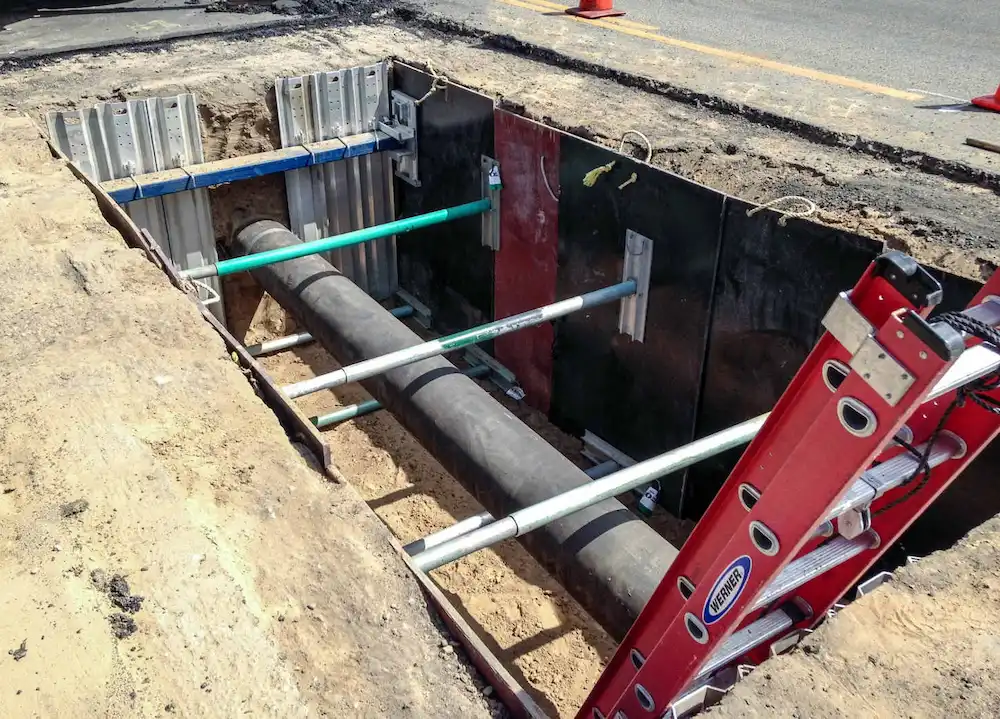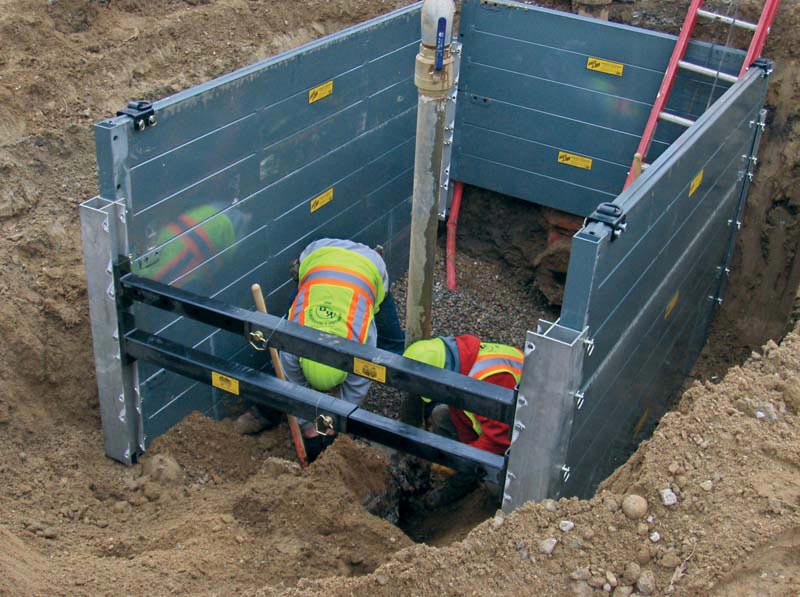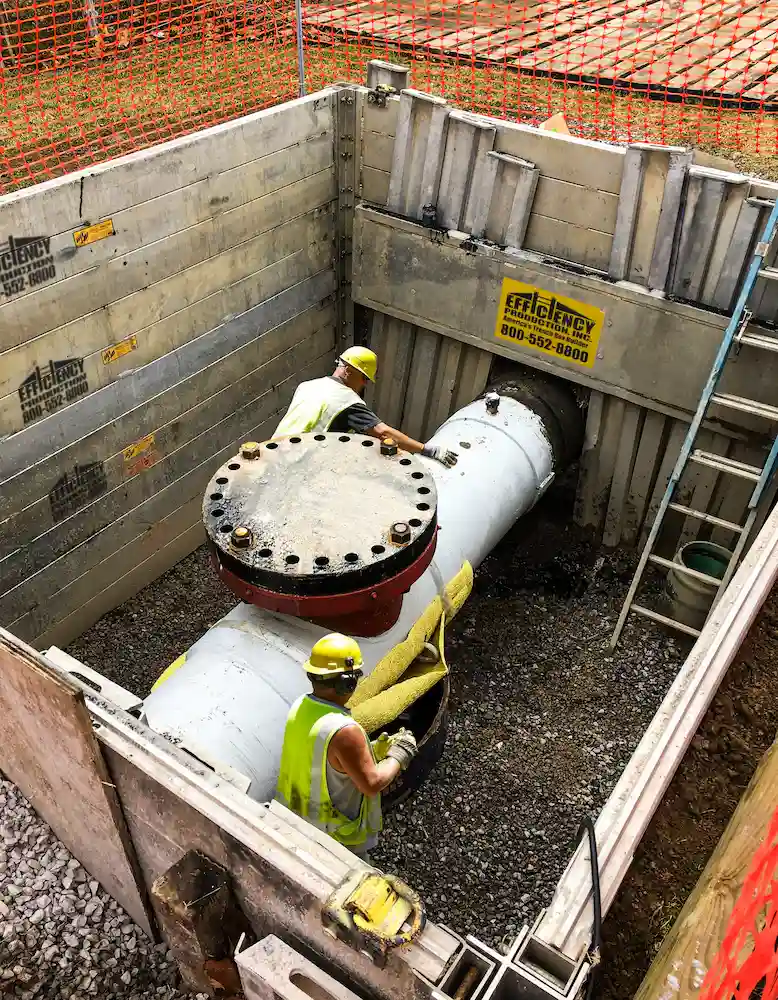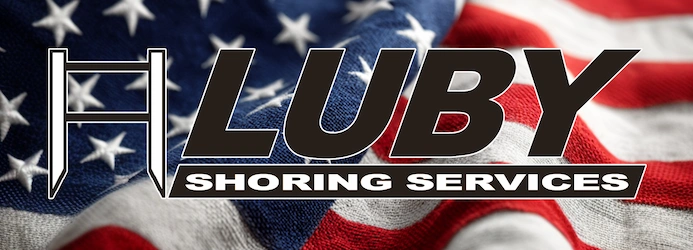
UTILITIES INDUSTRY
Trench Shoring in the Utilities Industry
In the utilities industry, trench shoring is vital for the safe and efficient installation or repair of underground gas, water, and electrical lines. These types of infrastructure are buried deep beneath the ground, often requiring extensive and intricate trenching. Unstable soil, underground hazards, and worker safety concerns make trench shoring essential to maintaining trench stability and preventing cave-ins. Companies like Luby Shoring are crucial in providing specialized shoring solutions to utility contractors and ensuring safety and regulatory compliance.

Water Line Installation and Repair
Water lines, from small residential supply lines to large municipal water mains, require deep and long trenches. Shoring ensures the safety and stability of the trenches, particularly when working with older infrastructure or in areas prone to soil erosion.
- Prevention of Soil Erosion: Water line projects are often complicated by factors such as wet soil, high groundwater levels, or proximity to other utilities. Luby Shoring’s shoring systems prevent trench walls from collapsing due to water erosion or unstable ground, ensuring a safe worksite and reducing the risk of damaging nearby infrastructure.
- Facilitating Large-Scale Projects: Municipal water systems can span entire cities, requiring shoring solutions adaptable to various depths and soil conditions. Luby Shoring offers trench boxes, hydraulic shoring, and other solutions that allow for the safe installation of pipes while minimizing disruptions to roads and public spaces.
- Safety and Efficiency: With Luby Shoring’s equipment, contractors can stabilize their work sites more efficiently, reduce the risk of costly rework due to collapses, and meet the required safety regulations for trenching and excavation.
Electrical Line Installation and Repair
As cities and towns expand, electrical lines are placed underground to improve reliability and reduce visual clutter. Whether for power distribution or telecommunications, these underground lines require precise trenching.
- Protection of Critical Infrastructure: Underground electrical lines are sensitive to external damage. Trench shoring ensures that the surrounding soil remains stable during excavation, preventing the trench from collapsing onto cables or conduits, which could result in costly outages or repairs.
- Worker Safety in Confined Spaces: Workers installing or repairing underground electrical lines often operate in tight, narrow trenches. Using trench boxes and hydraulic shoring systems from Luby Shoring provides them with a safe working environment, ensuring that trench walls are stable and the risk of accidents is minimized.
- Reducing Service Interruptions: Trench shoring helps streamline the installation and repair process of electrical lines, ensuring that workers can complete their tasks efficiently. This reduces the chances of prolonged service outages, which is critical for public and commercial operations that depend on uninterrupted power.

Gas Line Installation and Repair
Gas lines require precise trenching due to their volatile nature. Whether a new installation or repairing existing lines is being done, trench shoring ensures that the trench remains stable and that the workers are safe.
- Prevention of Hazardous Conditions: Gas lines can be hazardous if mishandled, as leaks could lead to explosions. Trench shoring creates a stable environment to ensure the pipeline’s integrity and prevents trench collapses that might damage the lines during installation or repair.
- Protection for Workers: Working around gas lines often means long hours in confined spaces. Hydraulic shoring systems or trench boxes from Luby Shoring safeguard workers from potentially life-threatening cave-ins, ensuring that safety remains the top priority.
- Efficiency and Compliance: Gas line projects are typically subject to stringent safety regulations, such as those from OSHA. Luby Shoring provides the equipment needed to meet these standards, which can reduce delays and keep projects on schedule.
Types of Trench Shoring Systems Used in Utility Projects
- Hydraulic Shoring: Often used in utility projects for gas and water lines, hydraulic shoring is flexible, easy to install, and perfect for shallow to moderate-depth trenches. Luby Shoring offers hydraulic systems that are light yet strong, helping utility workers safely manage trench work.
- Trench Boxes are ideal for deeper trenching work, such as large-scale water or electrical line installations. Luby Shoring provides trench boxes that offer robust support for trench walls, allowing workers to operate safely within the trench.
- Slide Rail Systems: Luby Shoring offers slide rail systems for more complex excavations. These systems provide extra stability and allow for deeper and broader trenching work.
Key Benefits of Trench Shoring for Utility Projects
- Ensuring Worker Safety: Trench shoring’s critical benefit is preventing cave-ins that could endanger workers during gas, water, or electrical lines excavation. With Luby Shoring’s systems, contractors can create a safe worksite, regardless of soil conditions.
- Preserving Infrastructure Integrity: Trench shoring keeps trenches stable, reducing the risk of damage to utility lines during installation or repair. This ensures the long-term functionality of gas, water, and electrical systems.
- Meeting Legal and Safety Requirements: Luby Shoring provides solutions that help contractors comply with local, state, and federal safety regulations, ensuring they meet OSHA standards for trench depth, soil stability, and worker protection.
- Improving Project Efficiency: By using trench shoring, contractors can reduce the time it takes to complete utility installation or repair projects. Luby Shoring’s systems are designed for quick installation and removal, allowing crews to work more efficiently and finish projects on time.
